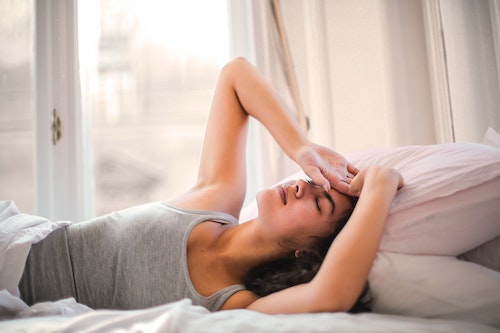
Insomnia During Menopause
Guiding women through their Menopause journey is what we do. FemStrong offers a 90-Day program for a happier and healthier you.
Insomnia
Menopause can be a time of great transformation, but it may also bring some uninvited guests to the party – such as insomnia. Sleepless nights can leave us feeling like we’re walking through life in a foggy haze. But worry not, dear friends! We’re here to help you understand and tackle insomnia during menopause so you can reclaim your well-deserved rest and wake up feeling refreshed and rejuvenated.
Why Does Menopause Give Me Insomnia?
Menopause can cause insomnia for several reasons:- Hormonal fluctuations: Changes in estrogen and progesterone levels can affect our sleep-wake cycle, making it harder to fall asleep and stay asleep.
- Hot flashes and night sweats: These menopausal symptoms can disrupt sleep by causing discomfort and frequent awakenings.
- Mood swings and anxiety: Emotional ups and downs, stress, and anxiety associated with menopause can make it difficult to relax and fall asleep.
Tips for Overcoming Insomnia During Menopause
Here are some effective strategies to help you conquer insomnia and enjoy a peaceful night’s rest:- Establish a sleep schedule: Go to bed and wake up at the same time every day, even on weekends, to regulate your body’s internal clock.\
- Create a bedtime routine: Develop a calming pre-sleep routine to signal your body that it’s time to wind down. This may include activities like reading, taking a warm bath, or practicing gentle stretches.
- Optimize your sleep environment: Make your bedroom a sleep sanctuary by keeping it cool, dark, and quiet. Invest in comfortable bedding and consider using blackout curtains or a white noise machine to enhance relaxation.
- Limit screen time before bed: The blue light emitted by screens can interfere with our sleep hormones. Turn off electronic devices at least an hour before bedtime to help your body prepare for sleep.
Lifestyle Changes to Support Better Sleep
Embrace these healthy habits to improve your sleep quality during menopause and beyond:- Exercise regularly: Regular physical activity can help balance hormones, reduce stress, and promote better sleep. However, avoid strenuous workouts close to bedtime, as they may have the opposite effect.
- Eat a balanced diet: Consuming a nutritious diet that includes magnesium-rich foods, such as leafy greens, nuts, and seeds, can support relaxation and better sleep.
- Limit caffeine and alcohol: Both caffeine and alcohol can disrupt sleep patterns, so minimize their consumption, especially in the hours leading up to bedtime.
- Manage stress: Practice relaxation techniques, such as meditation, deep breathing, or gentle yoga, to reduce stress and create a sense of calm before bedtime.


